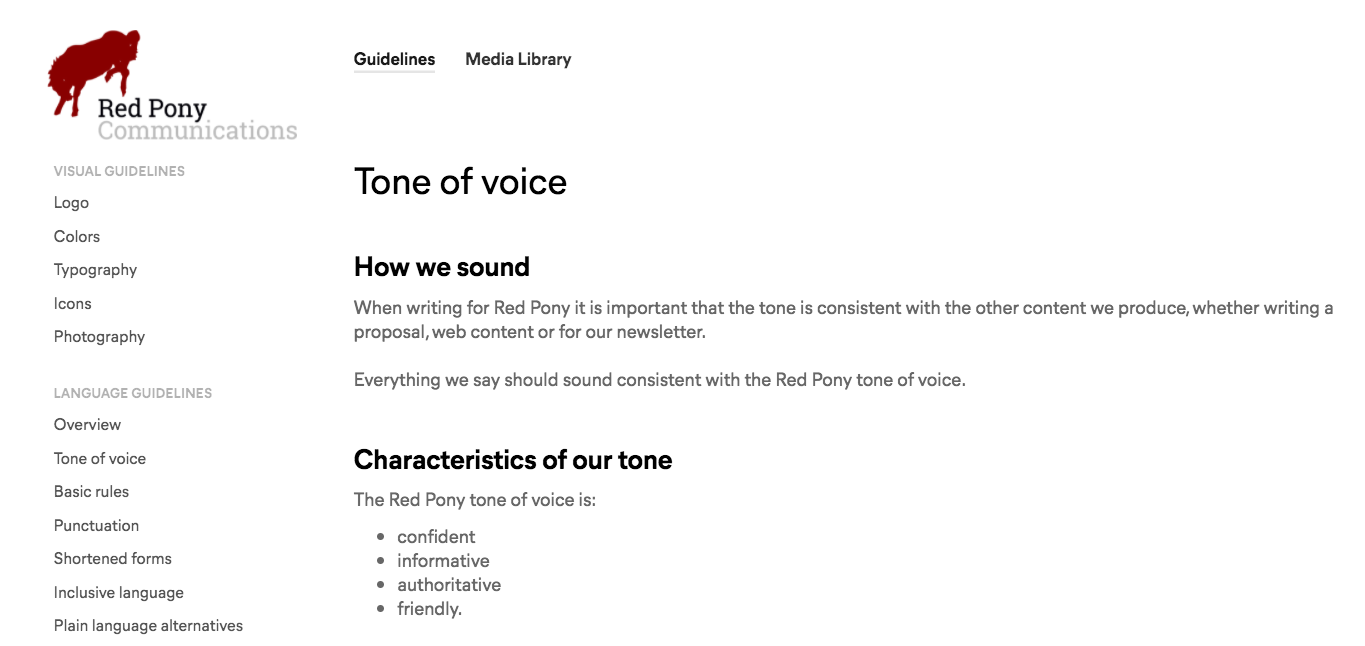Insights archive
Red Pony is a team of writers, editors, Microsoft Office template developers and communications trainers. We have been writing about our areas of expertise for over a decade in our Red Pony Express newsletter.
This collection features the best articles from the last 10 years.

False formality
The saying goes that you never get a second chance to make a first impression. The same is true for writing. Style – in how we choose an outfit or structure a sentence – evidences our desire to be taken seriously. People notice when we ‘make an effort’ with writing, the same way they notice when we wear a freshly ironed shirt.

Finding your flow
This is the first in a series of pieces to better understand how we can reach this ‘flow state’ to make writing and editing less painful and more rewarding.

Notes on transparency
If we take transparency to be a feature of good journalism and reporting, does that mean euphemism is an enemy of ‘good writing’?

Version control: keeping track of collaborative editing projects
Whether you’re writing for yourself, as part of a small team or a large government agency, version control is an essential part of the drafting process. Editing is no different.

Taking simple seriously
While we’ve documented the formal push by governments in the United States and New Zealand to legislate plain language in the past, we’ve recently seen a shift towards producing easier to read documents at the grassroots level here in Australia. At Red Pony, we use a 3-tier system to classify the different requirements for any simplified English project.

And the word of the year is...
Each year the Macquarie dictionary announces its choice for Word of the Year. The winner, and indeed the shortlist of candidates, offers an insight into the events of the previous 12 months and how our society is changing. 2022 was no exception.

Cite management
All writing which makes claims based on available information requires citation. To help use citations effectively, it’s important to understand why we use them and how to use citations appropriately in context.

NZ a step closer to making plain language law
The New Zealand Government is looking to pass legislation that will make it a legal requirement to use plain language for official documents and websites. It’s time we did the same in Australia.

Keeping up with language trends
For most Australians, 2020 will be forever remembered as the start of the COVID-19 pandemic. For the language geeks among us, it also marked the launch of 3 new national style guides.

Buzzwords: we love to hate them but what can they teach us?
Buzzwords have a knack for insinuating themselves into collective consciousness. More so than ever during the COVID-19 pandemic where terms such as ‘bubble’, ‘lockdown’, ‘roadmap’ are already so ingrained in our ‘new normal’ that we have come to revere or revile them.

Taking the pain out of annual reports
While your annual report might have to be compiled yearly, that doesn’t mean the same people will be involved each time. Document any lessons from the process that will make it easier next time around for all those involved.

Maintaining your language style guide
A language style guide specifies how people should write for your organisation – how formal or casual the tone, any preferences for certain terms, whether or not to use Oxford commas … it’s effectively the language equivalent of a design style guide that specifies such things as the colours of the logo and the fonts to use.

What’s a project worth?
Lately I’ve been refining the tools we use to estimate the cost of writing, editing and proofreading projects. I thought I’d share with you some of the variables we use to predict the time a particular project will involve – which in turn determines the amount we quote.

Beware the certainty of numbers
As uncertainty and confusion about COVID-19 continue in people’s lives, those hungry for information are finding themselves taking a crash course in epidemiological terms. A number of information platforms have responded by publishing their own COVID-19-related glossaries, including the Yale School of Medicine and our own ABC. But what about COVID-19 numbers?

Editing as an essential service
Despite all of our advances in science and technology, falsehoods about the origin, spread and effective treatment of COVID-19 abound. In fact, the most effective communication tool humans have invented to date – the internet – has only served to give oxygen to rumours and lies and helped them to proliferate.

Email tone detector: helpful tool or cultural imperialism?
I’m always interested to see how automation and artificial intelligence are being deployed to help people write more clearly. The latest innovation to catch my eye is a ‘tone detector’ from the popular writing assistant software developer Grammarly.
A Style manual for the digital age
Whenever I find myself editing a document, there are two resources I keep close at hand – a dictionary and the Australian Government Style manual. Unlike the dictionary, which I can access online (depending on the version required), the Style manual has always been a physical publication. Hopefully that is soon to change.
Editing with artificial intelligence
Futurists predict that many of the jobs we do today will cease to exist when human labour is replaced by artificial intelligence (AI). Is the occupation of professional editor likely to be one of them?
What can copyeditors learn from Hollywood?
When you see the opening sequences as Lucas originally filmed them – our introduction to the main characters of the film – it’s frankly a mess. The initial space battle and capture of Princess Leia’s ship is intercut with scenes of Luke Skywalker repairing some electronic device, watching the battle through binoculars, and engaging in excruciatingly clichéd small talk about how he’d love to become a fighter pilot but his aunt and uncle need him on the farm.
The genius of George Orwell
Back when I was a university student contemplating a topic for my English Literature Honours thesis, I thought it might be interesting to examine the early works of George Orwell, one of my favourite writers at the time. After twelve months of immersing myself in biographies, literacy criticism, opinion pieces and pretty much the entire […]
